Vaihayasi Pande Daniel/Rediff.com reports from the heat and dust of a Baramati rally with Supriya Sule, MP.
Photographs and video: Rajesh Karkera/Rediff.com
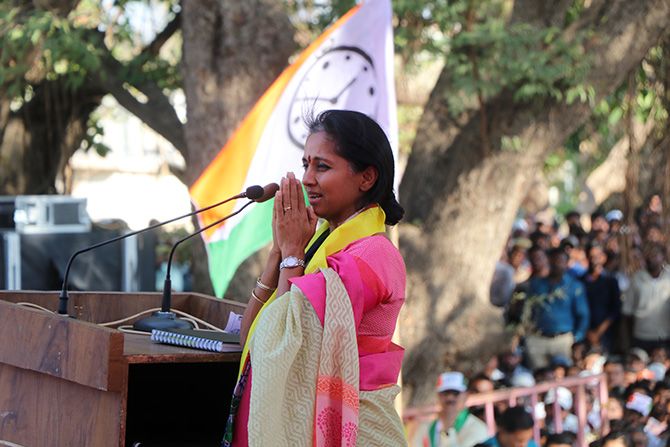
The biggest day in five years for Baramati is the election rally held on Sunday, April 21.
After the rally ends Sunday afternoon, two-time Nationalist Congress Party MP of this south central Maharashtra constituency, Supriya Sule, 49, wearing a brightly-hued sari, with an electric pink border, descends from the stage and plunges fearlessly into the swarming, swelling, whirling throng.
The crowd is delirious with joy to have her in their midst.
People circle about her, excitedly pushing closer and closer, mobbing her and showering love on their tai.
Scores whip out their cell phones to take selfies with her.
Others move nearer to greet her and chat or introduce a child or relative.
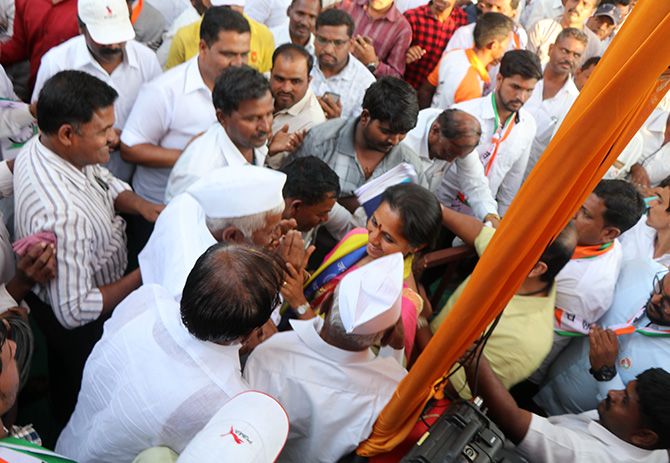
Working her way across the gathering, in the stupefying heat, a glowing Sule seems to be in her element, patiently stopping to meet as many hundreds as she can, offering each one a broad smile or a pat or a namaste or a few words of reassurance.
She is a natural.
Supriya is also indefatigable. Fiery and passionate too.
Her face sun-burned a deep dark brown -- the tan is her war paint -- suggested days spent tirelessly campaigning under the scorching, unforgiving summer sun. Reports have it that she began campaigning before anyone else in the country.
It doesn't require the skills of a learned psephologist to decipher that the two aces in Supriya's hand are: She is her father's daughter and her human touch.
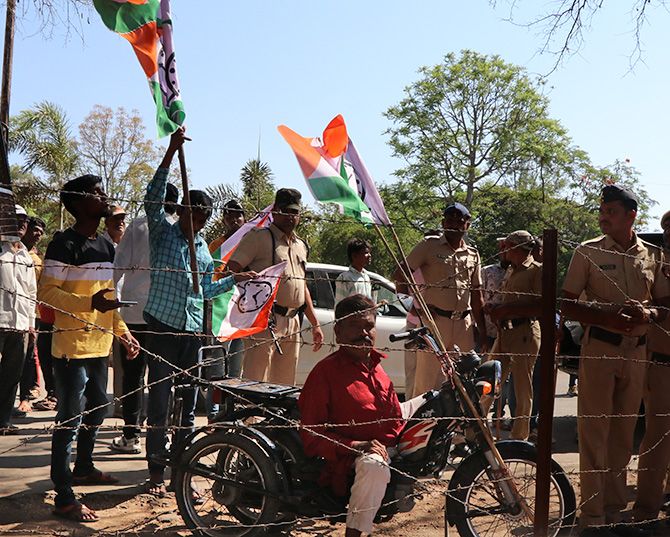
Sunday isn't just any rally.
This end-of-the-election season rally is a tradition in Baramati and with the Pawar family, that has continued for 25 years or so.
Baramati, a tidy, prosperous town of farmers and businessman of 124,000 people (as per 2016 figures), that is also the birthplace of Nathuram Godse, boasts a host of industries, many educational institutes and a modern-ness that is not rudely out of sync with countryside greened by sugarcane, palms and dairy farms.
The town, part of Pune district, has a literacy of 90.3 per cent, which is considerably higher than the state average of 82.3 per cent (as per 2011 census figures). But there are no statistics available for job growth, though there are mixed reports about the availability of continuous work for the less skilled.
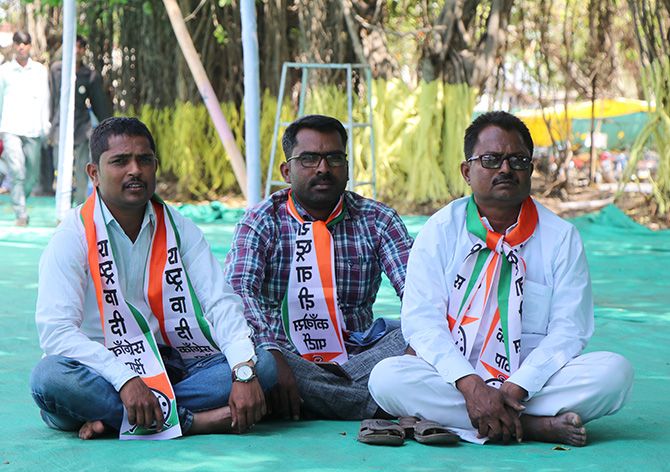
On early Sunday afternoon, NCP workers are still preparing the grounds where the rally would take place, near the Mission High School in the town centre, a few minutes away from the Church of Christ, where Easter service preparations were underway.
Loudspeakers are being tested and buntings draped and a few mamas (elderly local gentry) are nodding off, reclining on the dhurrie-covered ground.
Hardly an hour later, a few kilometres from the grounds, off in the distance a giant mushroom cloud of bikers comes into view on the horizon, rapidly advancing in a haze of dust, like a giant tornado on the move.
They are NCP supporters from villages near Malegaon, party flags fluttered gaily from their two-wheelers.
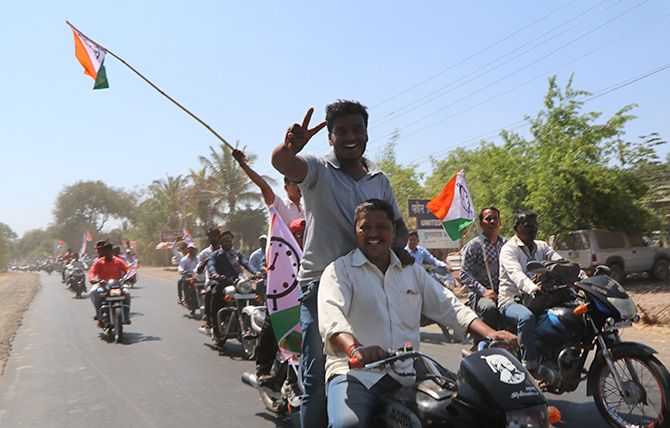
A Baramati resident named -- what else -- Pawar stops us on the side of the street to offer an interpretation of the enthusiasm of these arriving bikers.
"This is just one bunch of people from a village nearby, who are coming to attend the rally. If all the people from the nearby villages come, the roads will become too packed for anyone to move."
"Saheb (Sharad Pawar) doesn't need to campaign here. He will win even if he does not campaign. He has not done anything for me personally. But he has done so much for Baramati that we are all prospering because of that."
More supporters, mostly on motorcycles too (Baramati has numerous motorcycle dealerships), descend on the grounds from other directions. And the centre of town is deluged, roads closed to allow only pedestrian movement, police bandobast (security) in place.
By the time the rally begins dot on time at 3 pm, the grounds are packed and overflowing with thousands and thousands of supporters, with several hundreds camped on the road as well.
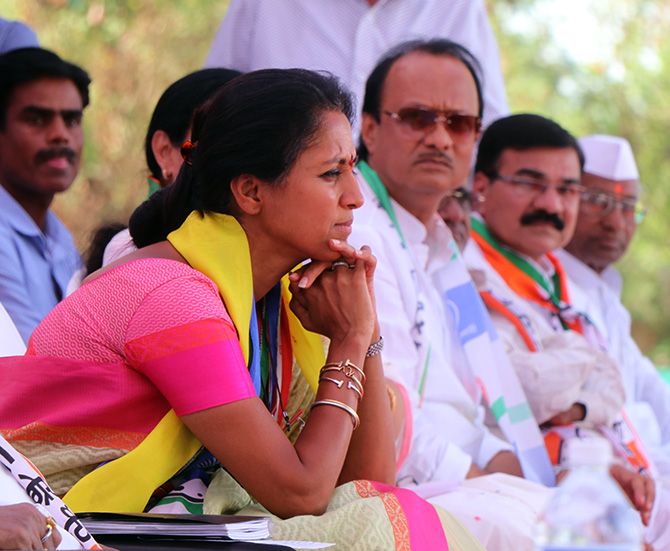
Present on the dais are NCP party leader Ajit Pawar (above, right), his uncle Sharad Pawar, former Maharashtra minister Anil Deshmukh and Supriya.
Supriya's husband Sadanand Sule, daughter Revati and son Vijay, who made a point to be in Baramati for this Pawar clan day, are seated in the crowd although Supriya declares later that though her children teach her "something every day" they are "very away from all this."
Sattar, sitting nearby, announces he is a "Mohammedan" and fishes out proudly from between the sweaty interior of his wallet and bunch of IDs a battered, dog-eared picture of Pawar visiting his home.
A young party supporter, a rousing speaker named Sakshina Salgar, from a farmer family with an MTech degree, who Supriya recruited on campus, starts up the rally, charming the crowd with her entertaining dialogue.
Upbraiding the BJP gang for their rude, crude campaigning, she used the analogy that if you are always spitting on others sometimes the same spit can come back down to fall on yourself.
Referring to BJP national President Amit Anilchandra Shah metaphorically as Kallu Mama -- the character Saurabh Shukla plays in Ram Gopal Verma's film Satya -- Salgar says she wants to tell Kallu Mama in front of her respected Saheb, Dada and all of Baramati that such "a liar and thug" should be thrown out of Maharashtra. She warns Shah, who held a rally in Baramati a few days earlier, to not even think of "eying Baramati."
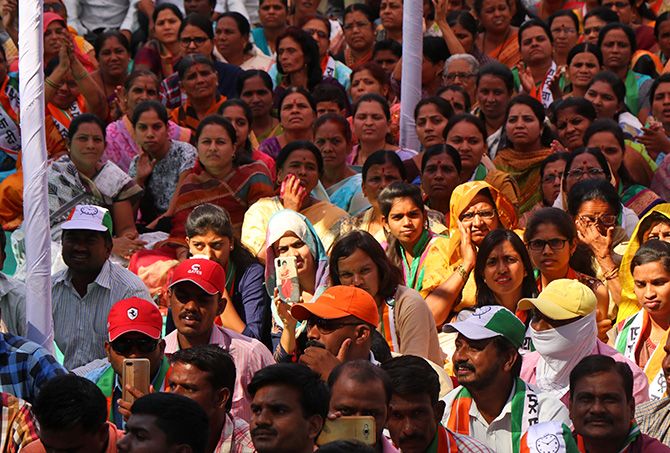
The BJP -- newbie Kanchan Kul is contesting against Supriya -- has focused considerable energies on Baramati this time round in a bid to uproot the Pawars, given the constituency is one where the party has not made much inroads till date.
Narendra Damodardas Modi was to address a rally in Baramati. Instead, Maharashtra Chief Minister Devendra Fadnavis and Shah have. There was hardly a single saffron lotus flag to be seen in the town limits.
In the last election Supriya emerged victorious with a 69,000 vote lead, considerably lower than her margin in the 2009 election of 300,000 votes. Kul's husband Rahul Kul is a Rashtriya Samaj Paksha legislator from nearby Daund.
Supriya proved herself in Parliament during her 2014-2019 term -- she asked the most questions -- 1,181 queries -- in the 16th Lok Sabha, a good number of them on education and was declared the top parliamentarian.
Her questions tackled varied issues including the Pradhan Mantri Awas Yojana, Kashmir, rural healthcare facilities, fires in coal mines and farmer suicides.
According to the PRS Legislative Research Web site her attendance was 96 per cent, and in some sessions 100 per cent. She also moved 22 private member's bills and was responsible for sparking 152 debates.
Supriya takes the podium just before her dad.
A competent speaker, strong-spoken, charged, what sets her apart from other speakers is her ability to speak as a leader rather than a politician.
She converses with the crowd about their most important issues, as if she is one of them, in a sort folksy, intimate manner, completely comfortable -- in spite of having been raised in faraway affluent south Mumbai -- in her neta skin, not devoting much time to taking on her opposition.
Her stance is explained by the upshot of her speech, which delivered in Marathi translated to: "I am the daughter of a fighter father. Nothing scares me, be it something from within this country. Or outside of it. I persevere with the truth by my side and am strengthened by the work I have done. I only ask for votes for the work I have done..."
"This election is not about our family. It is about the future of our country."
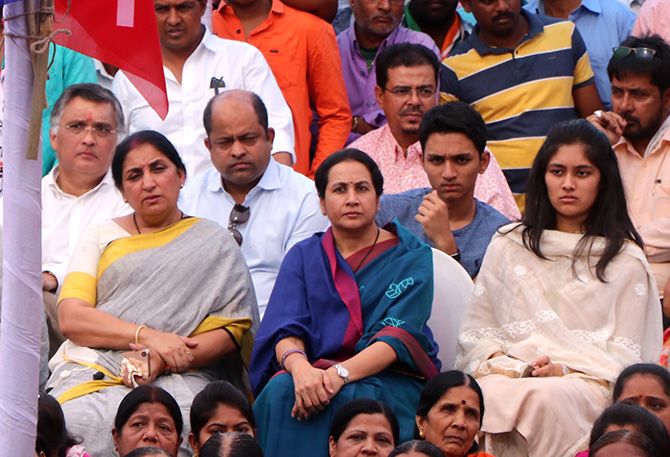
Towards the end of her speech she quotes stanzas from a poem by by Marathi poet and lyricist Dasu Vaidya: "Shramalelya bapasathi lek naralacha pani, ladhanarya lekisathi baap buland kahani (A daughter brings the same relief to a tired, hardworking father that the sweet water of a coconut does. For a daughter, who is a fighter, her father is her backbone)."
After her 10 minute-speech, her father Sharad Pawar, referred to respectfully as just Saheb in these parts, addresses the rally. His tone sombre, quiet, but gathering, effortlessly, appreciation, laughter and reverence.
Cousin Ajit Pawar speaks next and after that a few more and by 5.30 the rally is done.
Supriya spends that golden half an hour, after the rally, meeting the audience and bonding with them, followed by her women volunteers/security.
8 minutes with Supriya Sule
In the five to eight minutes in which she was travelling post the rally, between one venue and the next, she spoke to Rediff.com's Vaihayasi Pande Daniel.
Supriya isn't interested in discussing what she perceives as notional issues in this election like Hindu nationalism or even Narendra Damodardas Modi or anything similar, believing firmly and patly that elections results should and do reflect the development work invested in a constituency.
She will not be drawn into conversation other than on these topics, judging the rest to be extraneous.
How has this election been different for you?
Every election for me is the same. Nothing different.
But three elections later – facing your third election -- how have you changed in how you handle things and what have you understood better?
I just feel very good about my work. I am very content about my work.
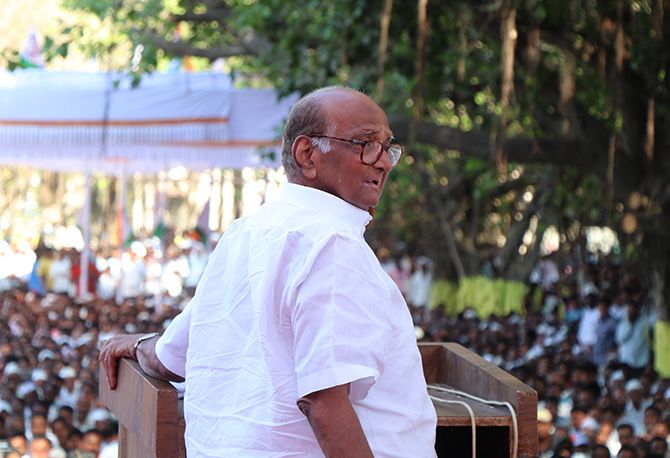
What about this election -- not necessarily in your seat -- is different as far as you can see?
I really see no difference. It is like any election, where we fight for the rights of people.
What does urban India need to understand about elections and politics across India?
I think the Indian voter is very smart. Whether rural or urban doesn't make a difference. The Indian voter is very smart!
When I met you in 2014 your constituency was delimited and you were campaigning in Pune too. Do you have to campaign always a little harder in Pune to win over people?
I campaign everywhere equally.
But what is your general sense?
I get a good sense when I go to people here.
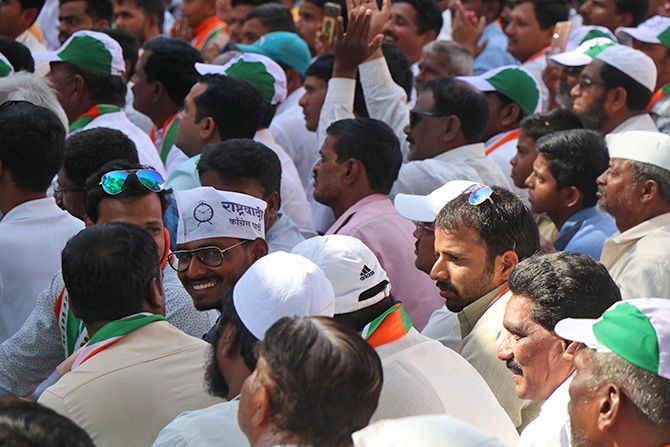
Pune also?
Ya, ya.
Even urban Pune?
I am an urban girl. Why would I have a problem communicating with them?
What advantages do you think you have as a leader over someone like Modi, who is supposed to be runaway popular?
I don't think it is about popularity. We are not film stars. We are workers.
Well maybe I am using a wrong word. What strengths do you have that give you advantages over even a popular leader like Modi?
My constituency is one of the top-performing constituencies in the country. The work speaks for itself.
It is not about connecting. It is about working. My job is not about popularity, it is about work.
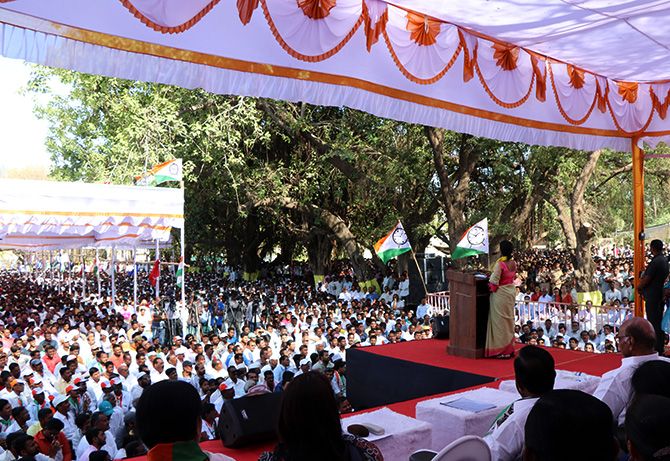
What has been responsible for the successes of Baramati?
It is because of development.
More and more people want to come here because the quality of life is much better. Yes, prosperity.
Good quality education. Health care. Opportunities. Jobs.
Over the last four or five years or longer, what have been your own greatest successes and what have been the hardest things to conquer?
Hardest thing to conquer has been famine. Water. Global warming. All out of my control. Those are the very big challenges.
Successes are all the development work which has continued.
What is the development work you are most proud of? Which area?
Anaemia in my constituency has gone down substantially. And my constituency is the third in the country (among) high performing constituencies.
What things do you do differently from your father? And what things do you do like him?
Well, we all need to work harder. He works very hard.
Why would I want to do anything differently?
Well just because you belong to a different generation?
He is very modern in his thinking. Look at the modern constituency he has built.
So you continue to take a page out his way of working?
Absolutely.
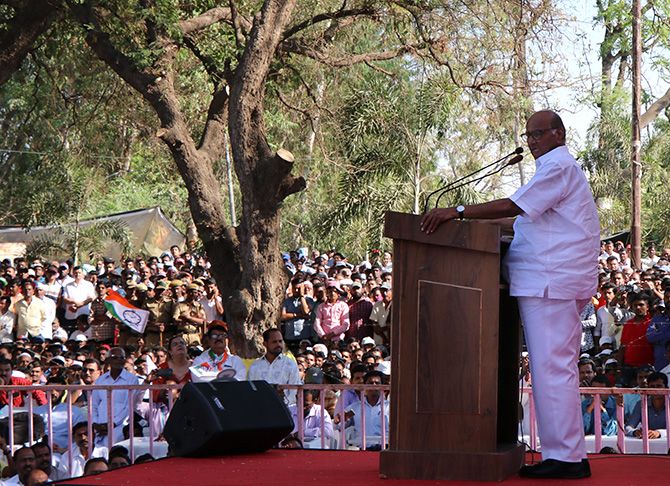
What about Hindu nationalism and its growing popularity?
Do you think it is something that India needs to be worried about?
I am a proud Indian. I don't think about it. I take pride in being an Indian.
People keep talking things. I don't worry about it. I don't think about it. I just keep working.
I work on development, education, health care and I keep doing my job. I don't ignore it. I don't even think about it.
I keep working relentlessly and I take pride in being an Indian.
What is your emotional draw to Baramati?
I belong here. It is my emotional attachment. I am born here, bred here. Everything. It is home. Really it is home.
Even two elections later are there still certain aspects that are hard to understand about Indian elections and the way India votes?
I don't think I find it hard.
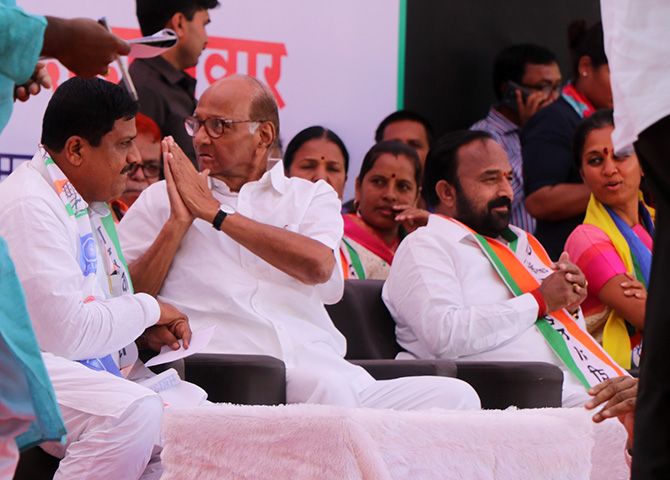
What is easy to fathom then?
It is not easy -- if you are doing a job you have to keep working at it. You have to keep understanding and studying more and working hard.
Whenever you are in Baramati what are some of the things you must do every time you come here?
Make people's lives better.
I go to the people. People don't need to come to me. If you check my Facebook account it will tell you everything that I do. That shows my connect with the people.
Nationally, is there anything different issue-wise in this election in which Modi is attempting to be re-elected?
I don't even think about it. I think it is a development oriented issue. And I think that is what we should all stick to.
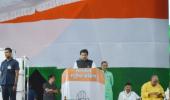



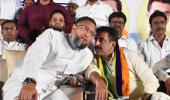







 © 2025
© 2025